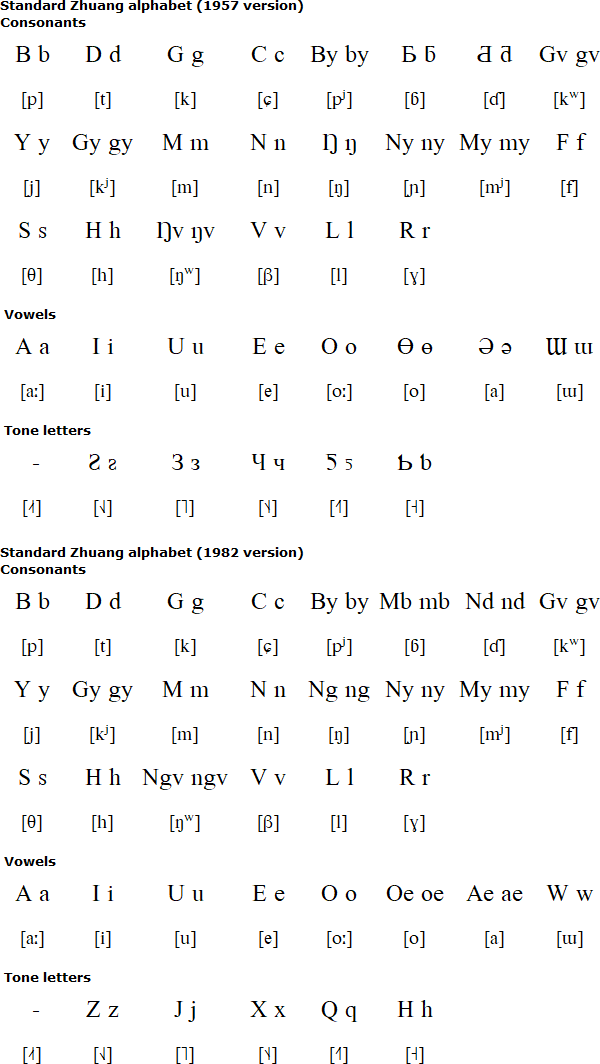The Zhuang languages belong to the northern and Central Tai branches of the Kra-Dai language family. They are spoken mainly in Guangxi Zhuang Autonomous Region in southern China, and also in Yunnan, Guangdong, Guizhou, and Hunan Provinces.
Chinese linguists classify varieties of Zhuang into two groups: northern Zhuang dialects and southern Zhuang dialects. The different varieties of Zhuang are closely related, but not mutually intelligible. According to some linguists there are 36 distinct varieties of Zhuang, while others identify 13-16 varieties [source].
Standard Zhuang, the official version of Zhuang used and promoted by the Chinese government, is based mainly on the Yongbei dialect of Northern Zhuang, which is spoken in Shuangquiao in Wuming District of Guangxi, and on other northern dialects. Standard Zhuang has six tones. Other varities of Zhuang have between 5 to 11 tones.
 Zhuang was originally written with a mixture of standard Chinese characters, Chinese-like characters and other symbols. This script, known as the Old Zhuang Script or sawndip ("immature character"), dates back to the Tang Dynasty (618-907 AD) and was used to write folktales, myths, songs, play scripts, medical prescriptions, family genealogies, contracts, communist
revolutionary propaganda, etc.
Zhuang was originally written with a mixture of standard Chinese characters, Chinese-like characters and other symbols. This script, known as the Old Zhuang Script or sawndip ("immature character"), dates back to the Tang Dynasty (618-907 AD) and was used to write folktales, myths, songs, play scripts, medical prescriptions, family genealogies, contracts, communist
revolutionary propaganda, etc.
There are 16 main dialects of Zhuang, some of which differ from one another so much that they are mutually unintelligible, and therefore some linguists consider Zhuang a collection of closely related language rather than a single language with different dialects.
There is a standardised form of Zhuang, known as Yongbei Zhuang, based on the dialect of Wuming County in Guangxi. A slightly different standard, known as Bouyei, is used in Guizhou. A method of writing Zhuang based on the Wuming dialect and using a mixture of Latin and Cyrillic letters and a number of IPA symbols was devised in 1955. A reform in 1986 removed the non-Latin letters and replaced them with individual Latin letters or combinations of Latin letters.
Zhuang is a tonal language and Yongbei Zhuang has six tones which are indicated in writing with particular letters.

Download an alphabet chart for Zhuang (Excel)
Bouч bouч ma dəŋƨ laзƃɯn couƅ miƨ cɯyouƨ, cinƅyenƨ cəuƽ genƨli bouчbouч biŋƨdəŋз. Gyɵŋƽ vunƨ miƨ liзsiŋ cəuƽ lieŋƨsim, ɯŋdaŋ daiƅ gyɵngƽ de lumз beiчnueŋч ityieŋƅ.
Boux boux ma daengz lajmbwn couh miz cwyouz, cinhyenz caeuq genzli bouxboux bingzdaengj. Gyoengq vunz miz lijsing caeuq liengzsim, wngdang daih gyoengq de lumj beixnuengx ityiengh.

All human beings are born free and equal in dignity and rights. They are endowed with reason and conscience and should act towards one another in a spirit of brotherhood.
(Article 1 of the Universal Declaration of Human Rights)
Information about Zhuang | Phrases in Yongbei Zhuang | Numbers in Yongbei Zhuang
Information about the Zhuang language
http://en.wikipedia.org/wiki/Zhuang_language
https://en.wikipedia.org/wiki/Standard_Zhuang
http://web.hku.hk/~zhuang/Workshop/Abstracts.htm
http://www006.upp.so-net.ne.jp/FFS/zhuangyu_ch00.htm
http://www.sanamionline.net/the-zhuang-language/
Information about the Old Zhuang Script
http://en.wikipedia.org/wiki/Sawndip
http://east-chr-data.sourceforge.net/
Information about the Zhuang people
http://en.wikipedia.org/wiki/Zhuang
http://www.chsource.org/Zhuang.htm
Ahom, Aiton, Bouyei, Isan, Kam, Khamti, (Tai) Khün, Lao, Lue, Northern Thai (Kam Mueang), Nùng, Shan, Sui, Tai Dam, Tai Dón, Tai Hongjin, Tai Laing, Tai Nuea, Tai Phake, Tai Ya, Tai Yo, Thai, Thai Song, Yang Zhuang, Zhuang
Languages written with the Latin alphabet
Akkadian Cuneiform, Ancient Egyptian (Demotic), Ancient Egyptian (Hieratic), Ancient Egyptian (Hieroglyphs), Chinese, Chữ-nôm, Cuneiform, Japanese, Jurchen, Khitan, Linear B, Luwian, Mayan, Naxi, Sawndip (Old Zhuang), Sui, Sumerian Cuneiform, Tangut (Hsihsia)
Page last modified: 15.03.23
[top]
You can support this site by Buying Me A Coffee, and if you like what you see on this page, you can use the buttons below to share it with people you know.

If you like this site and find it useful, you can support it by making a donation via PayPal or Patreon, or by contributing in other ways. Omniglot is how I make my living.
Note: all links on this site to Amazon.com, Amazon.co.uk
and Amazon.fr
are affiliate links. This means I earn a commission if you click on any of them and buy something. So by clicking on these links you can help to support this site.
[top]